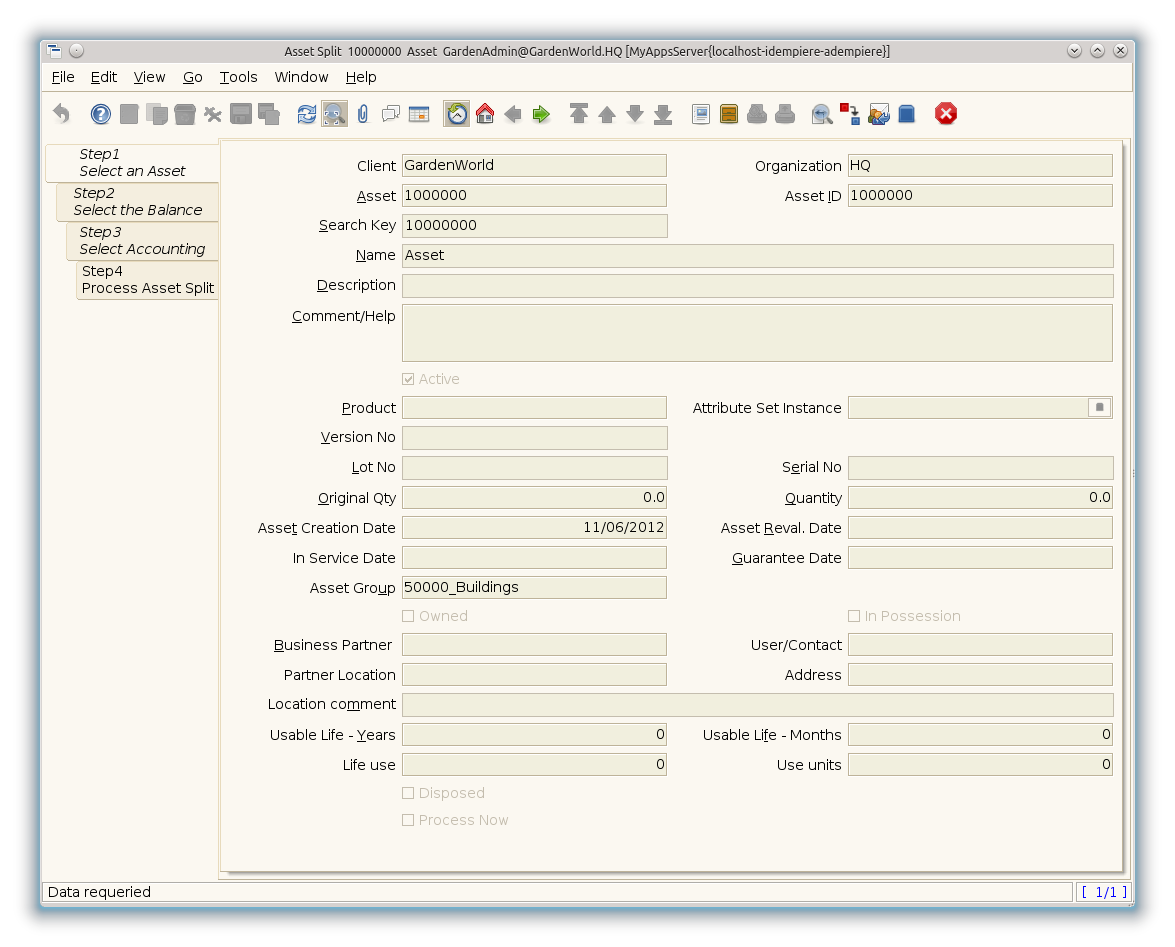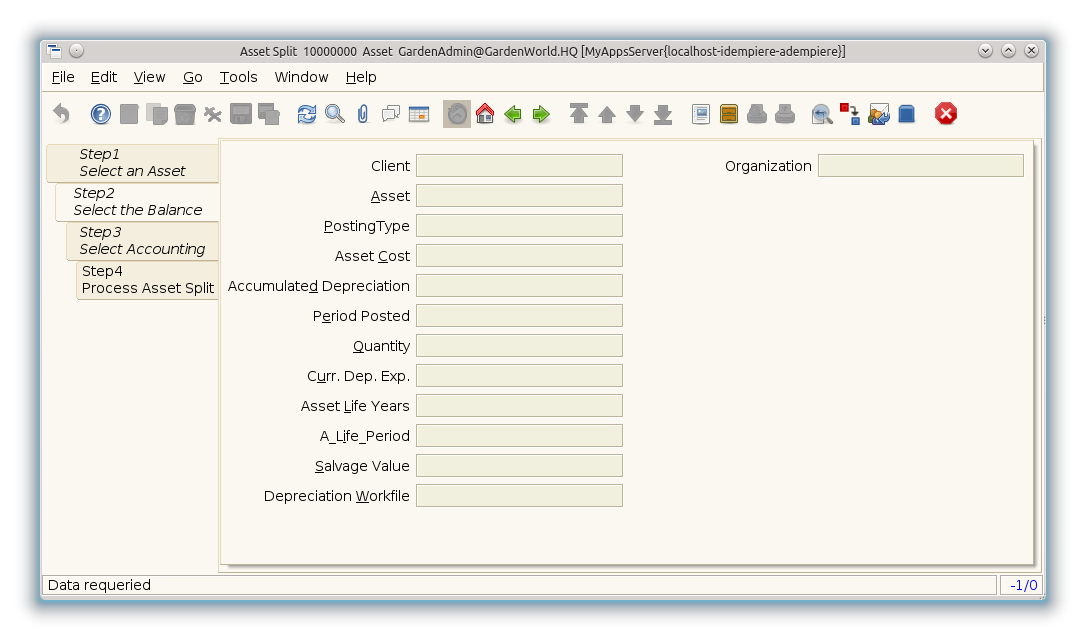Template:Asset Split (Window ID-53048 V1.0.0)
Window: Asset Split
Description: Split Assets Process
Help: The Asset Split window allows you to process asset splits
TAB: Step1 Select an Asset
Description: List of Assets
Help null
| Name | Name | Description | Help | Specifications |
|---|---|---|---|---|
| Client | Client | Client/Tenant for this installation. | A Client is a company or a legal entity. You cannot share data between Clients. Tenant is a synonym for Client. | AD_Client_ID numeric(10) NOT NULL Table Direct |
| Organization | Organization | Organizational entity within client | An organization is a unit of your client or legal entity - examples are store, department. You can share data between organizations. | AD_Org_ID numeric(10) NOT NULL Table Direct |
| Asset | Asset | Asset used internally or by customers | An asset is either created by purchasing or by delivering a product. An asset can be used internally or be a customer asset. | A_Asset_ID numeric(10) NOT NULL ID |
| Asset ID | Asset ID | null | null | A_Parent_Asset_ID numeric(10) Search |
| Search Key | Search Key | Search key for the record in the format required - must be unique | A search key allows you a fast method of finding a particular record.
If you leave the search key empty, the system automatically creates a numeric number. The document sequence used for this fallback number is defined in the "Maintain Sequence" window with the name "DocumentNo_<TableName>", where TableName is the actual name of the table (e.g. C_Order). |
Value character varying(40) NOT NULL String |
| Name | Name | Alphanumeric identifier of the entity | The name of an entity (record) is used as an default search option in addition to the search key. The name is up to 60 characters in length. | Name character varying(60) NOT NULL String |
| Description | Description | Optional short description of the record | A description is limited to 255 characters. | Description character varying(255) String |
| Comment/Help | Comment/Help | Comment or Hint | The Help field contains a hint, comment or help about the use of this item. | Help character varying(2000) Text |
| Active | Active | The record is active in the system | There are two methods of making records unavailable in the system: One is to delete the record, the other is to de-activate the record. A de-activated record is not available for selection, but available for reports.
There are two reasons for de-activating and not deleting records: (1) The system requires the record for audit purposes. (2) The record is referenced by other records. E.g., you cannot delete a Business Partner, if there are invoices for this partner record existing. You de-activate the Business Partner and prevent that this record is used for future entries. |
IsActive character(1) NOT NULL Yes-No |
| Product | Product | Product, Service, Item | Identifies an item which is either purchased or sold in this organization. | M_Product_ID numeric(10) Search |
| Attribute Set Instance | Attribute Set Instance | Product Attribute Set Instance | The values of the actual Product Attribute Instances. The product level attributes are defined on Product level. | M_AttributeSetInstance_ID numeric(10) Product Attribute |
| Version No | Version No | Version Number | null | VersionNo character varying(20) String |
| Lot No | Lot No | Lot number (alphanumeric) | The Lot Number indicates the specific lot that a product was part of. | Lot character varying(255) String |
| Serial No | Serial No | Product Serial Number | The Serial Number identifies a tracked, warranted product. It can only be used when the quantity is 1. | SerNo character varying(255) String |
| Original Qty | Original Qty | null | null | A_QTY_Original numeric Number |
| Quantity | Quantity | null | null | A_QTY_Current numeric Number |
| Asset Creation Date | Asset Creation Date | null | null | A_Asset_CreateDate timestamp without time zone Date |
| Asset Reval. Date | Asset Reval. Date | null | null | A_Asset_RevalDate timestamp without time zone Date |
| In Service Date | In Service Date | Date when Asset was put into service | The date when the asset was put into service - usually used as start date for depreciation. | AssetServiceDate timestamp without time zone Date |
| Guarantee Date | Guarantee Date | Date when guarantee expires | Date when the normal guarantee or availability expires | GuaranteeDate timestamp without time zone Date |
| Asset Group | Asset Group | Group of Assets | The group of assets determines default accounts. If an asset group is selected in the product category, assets are created when delivering the asset. | A_Asset_Group_ID numeric(10) NOT NULL Table Direct |
| Owned | Owned | The asset is owned by the organization | The asset may not be in possession, but the asset is legally owned by the organization | IsOwned character(1) NOT NULL Yes-No |
| In Possession | In Possession | The asset is in the possession of the organization | Assets which are not in possession are e.g. at Customer site and may or may not be owned by the company. | IsInPosession character(1) NOT NULL Yes-No |
| Business Partner | Business Partner | Identifies a Business Partner | A Business Partner is anyone with whom you transact. This can include Vendor, Customer, Employee or Salesperson | C_BPartner_ID numeric(10) Search |
| User/Contact | User/Contact | User within the system - Internal or Business Partner Contact | The User identifies a unique user in the system. This could be an internal user or a business partner contact | AD_User_ID numeric(10) Table Direct |
| Partner Location | Partner Location | Identifies the (ship to) address for this Business Partner | The Partner address indicates the location of a Business Partner | C_BPartner_Location_ID numeric(10) Table Direct |
| Address | Address | Location or Address | The Location / Address field defines the location of an entity. | C_Location_ID numeric(10) Search |
| Locator | Locator | Warehouse Locator | The Locator indicates where in a Warehouse a product is located. | M_Locator_ID numeric(10) Table Direct |
| Location comment | Location comment | Additional comments or remarks concerning the location | null | LocationComment character varying(255) String |
| Depreciate | Depreciate | The asset will be depreciated | The asset is used internally and will be depreciated | IsDepreciated character(1) NOT NULL Yes-No |
| Fully depreciated | Fully depreciated | The asset is fully depreciated | The asset costs are fully amortized. | IsFullyDepreciated character(1) NOT NULL Yes-No |
| Usable Life - Years | Usable Life - Years | Years of the usable life of the asset | null | UseLifeYears numeric(10) Integer |
| Usable Life - Months | Usable Life - Months | Months of the usable life of the asset | null | UseLifeMonths numeric(10) Integer |
| Life use | Life use | Units of use until the asset is not usable anymore | Life use and the actual use may be used to calculate the depreciation | LifeUseUnits numeric Integer |
| Use units | Use units | Currently used units of the assets | null | UseUnits numeric Integer |
| Asset Depreciation Date | Asset Depreciation Date | Date of last depreciation | Date of the last deprecation, if the asset is used internally and depreciated. | AssetDepreciationDate timestamp without time zone Date |
| Disposed | Disposed | The asset is disposed | The asset is no longer used and disposed | IsDisposed character(1) NOT NULL Yes-No |
| Asset Disposal Date | Asset Disposal Date | Date when the asset is/was disposed | null | AssetDisposalDate timestamp without time zone Date |
| Process Now | Process Now | null | null | Processing character(1) Yes-No |
TAB: Step2 Select the Balance
Description: null
Help null
| Name | Name | Description | Help | Specifications |
|---|---|---|---|---|
| Client | Client | Client/Tenant for this installation. | A Client is a company or a legal entity. You cannot share data between Clients. Tenant is a synonym for Client. | AD_Client_ID numeric(10) NOT NULL Table Direct |
| Organization | Organization | Organizational entity within client | An organization is a unit of your client or legal entity - examples are store, department. You can share data between organizations. | AD_Org_ID numeric(10) NOT NULL Table Direct |
| Asset | Asset | Asset used internally or by customers | An asset is either created by purchasing or by delivering a product. An asset can be used internally or be a customer asset. | A_Asset_ID numeric(10) NOT NULL ID |
| PostingType | PostingType | The type of amount that this journal updated | The Posting Type indicates the type of amount (Actual, Encumbrance, Budget) this journal updated. | PostingType character(1) List |
| Asset Cost | Asset Cost | null | null | A_Asset_Cost numeric Amount |
| Accumulated Depreciation | Accumulated Depreciation | null | null | A_Accumulated_Depr numeric Amount |
| Period Posted | Period Posted | null | null | A_Period_Posted numeric(10) Integer |
| Quantity | Quantity | null | null | A_QTY_Current numeric NOT NULL Number |
| Curr. Dep. Exp. | Curr. Dep. Exp. | null | null | A_Curr_Dep_Exp numeric Amount |
| Asset Life Years | Asset Life Years | null | null | A_Asset_Life_Years numeric(10) NOT NULL Integer |
| A_Life_Period | A_Life_Period | null | null | A_Life_Period numeric(10) Integer |
| Salvage Value | Salvage Value | null | null | A_Salvage_Value numeric Amount |
| Depreciation Workfile | Depreciation Workfile | null | null | A_Depreciation_Workfile_ID numeric(10) NOT NULL ID |
TAB: Step3 Select Accounting
Description: Select the fixed asset setup that you wish to split
Help null
File:Asset Split - Step3 Select Accounting - Window (iDempiere 1.0.0).png
| Name | Name | Description | Help | Specifications |
|---|---|---|---|---|
| Client | Client | Client/Tenant for this installation. | A Client is a company or a legal entity. You cannot share data between Clients. Tenant is a synonym for Client. | AD_Client_ID numeric(10) NOT NULL Table Direct |
| Organization | Organization | Organizational entity within client | An organization is a unit of your client or legal entity - examples are store, department. You can share data between organizations. | AD_Org_ID numeric(10) NOT NULL Table Direct |
| Accounting Schema | Accounting Schema | Rules for accounting | An Accounting Schema defines the rules used in accounting such as costing method, currency and calendar | C_AcctSchema_ID numeric(10) NOT NULL Table Direct |
| Asset | Asset | Asset used internally or by customers | An asset is either created by purchasing or by delivering a product. An asset can be used internally or be a customer asset. | A_Asset_ID numeric(10) NOT NULL ID |
| PostingType | PostingType | The type of amount that this journal updated | The Posting Type indicates the type of amount (Actual, Encumbrance, Budget) this journal updated. | PostingType character(1) NOT NULL List |
| Period Start | Period Start | null | null | A_Period_Start numeric(10) NOT NULL Integer |
| Period End | Period End | null | null | A_Period_End numeric(10) NOT NULL Integer |
| Depreciation Type | Depreciation Type | null | null | A_Depreciation_ID numeric(10) NOT NULL Table |
| Depreciation Manual Amount | Depreciation Manual Amount | null | null | A_Depreciation_Manual_Amount numeric Amount |
| Depreciation Manual Period | Depreciation Manual Period | null | null | A_Depreciation_Manual_Period character varying(2) List |
| Depreciation Table Header | Depreciation Table Header | null | null | A_Depreciation_Table_Header_ID numeric(10) Table |
| Depreciation Variable Perc. | Depreciation Variable Perc. | null | null | A_Depreciation_Variable_Perc numeric Number |
| Asset Spread | Asset Spread | null | null | A_Asset_Spread_ID numeric(10) Table |
| Depreciation Calculation Type | Depreciation Calculation Type | null | null | A_Depreciation_Method_ID numeric(10) NOT NULL Table |
| Convention Type | Convention Type | null | null | A_Depreciation_Conv_ID numeric(10) NOT NULL Table |
| Salvage Value | Salvage Value | null | null | A_Salvage_Value numeric NOT NULL Amount |
| Split Percentage | Split Percentage | null | null | A_Split_Percent numeric NOT NULL Number |
| Asset Cost Account | Asset Cost Account | null | null | A_Asset_Acct numeric(10) Account |
| Accumulated Depreciation | Accumulated Depreciation | null | null | A_Accumdepreciation_Acct numeric(10) Account |
| Depreciation Expense Account | Depreciation Expense Account | null | null | A_Depreciation_Acct numeric(10) Account |
| Disposal Revenue | Disposal Revenue | null | null | A_Disposal_Revenue character varying(40) Account |
| Loss on Disposal | Loss on Disposal | null | null | A_Disposal_Loss character varying(40) Account |
| Revaluation Calculation Method | Revaluation Calculation Method | null | null | A_Reval_Cal_Method character varying(3) List |
| Revaluation Cost Offset for Current Year | Revaluation Cost Offset for Current Year | null | null | A_Reval_Cost_Offset character varying(22) Account |
| Revaluation Cost Offset for Prior Year | Revaluation Cost Offset for Prior Year | null | null | A_Reval_Cost_Offset_Prior character varying(22) Account |
| Revaluation Accumulated Depreciation Offset for Current Year | Revaluation Accumulated Depreciation Offset for Current Year | null | null | A_Reval_Accumdep_Offset_Cur character varying(22) Account |
| Revaluation Accumulated Depreciation Offset for Prior Year | Revaluation Accumulated Depreciation Offset for Prior Year | null | null | A_Reval_Accumdep_Offset_Prior character varying(22) Account |
| Revaluation Expense Offs | Revaluation Expense Offs | null | null | A_Reval_Depexp_Offset character varying(22) Account |
| Asset Acct. | Asset Acct. | null | null | A_Asset_Acct_ID numeric(10) NOT NULL ID |
TAB: Step4 Process Asset Split
Description: Split Assets
Help null
File:Asset Split - Step4 Process Asset Split - Window (iDempiere 1.0.0).png
| Name | Name | Description | Help | Specifications |
|---|---|---|---|---|
| Client | Client | Client/Tenant for this installation. | A Client is a company or a legal entity. You cannot share data between Clients. Tenant is a synonym for Client. | AD_Client_ID numeric(10) NOT NULL Table Direct |
| Organization | Organization | Organizational entity within client | An organization is a unit of your client or legal entity - examples are store, department. You can share data between organizations. | AD_Org_ID numeric(10) NOT NULL Table Direct |
| Asset | Asset | Asset used internally or by customers | An asset is either created by purchasing or by delivering a product. An asset can be used internally or be a customer asset. | A_Asset_ID numeric(10) NOT NULL ID |
| To Asset ID | To Asset ID | null | null | A_Asset_ID_To character varying(22) Table |
| PostingType | PostingType | The type of amount that this journal updated | The Posting Type indicates the type of amount (Actual, Encumbrance, Budget) this journal updated. | PostingType character(1) NOT NULL List |
| Period | Period | Period of the Calendar | The Period indicates an exclusive range of dates for a calendar. | C_Period_ID numeric(10) NOT NULL Table |
| Account Date | Account Date | Accounting Date | The Accounting Date indicates the date to be used on the General Ledger account entries generated from this document. It is also used for any currency conversion. | DateAcct timestamp without time zone NOT NULL Date |
| Split Type | Split Type | null | null | A_Split_Type character varying(3) NOT NULL List |
| Quantity | Quantity | null | null | A_QTY_Current numeric NOT NULL Number |
| Qty. Split | Qty. Split | null | null | A_QTY_Split numeric Number |
| Asset Cost | Asset Cost | null | null | A_Asset_Cost numeric Amount |
| Amount Split | Amount Split | null | null | A_Amount_Split numeric Amount |
| A_Percent_Split | A_Percent_Split | null | null | A_Percent_Split numeric Number |
| Transfer Balance IS | Transfer Balance IS | null | null | A_Transfer_Balance_IS character(1) NOT NULL Yes-No |
| A_Asset_Split | A_Asset_Split | null | null | Processing character(1) NOT NULL Button |


